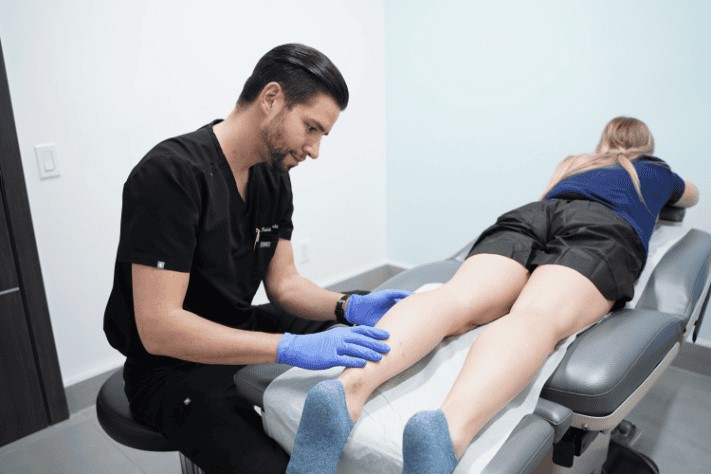
Understanding the Role of a Doctor in Treating Varicose Veins
Varicose veins are a common condition that affects many individuals worldwide. They are twisted, enlarged veins, often appearing blue or dark purple. While any vein in the body can become varicose, they most commonly affect the veins in the legs and feet due to standing and walking, which increase the pressure in the veins of the lower body. This condition can lead to discomfort and pain, affecting the quality of life for those who suffer from it. So, what type of doctor treats varicose veins effectively? Let’s delve into this topic to understand more about the specialists involved and their roles.
The Importance of Choosing the Right Specialist
When it comes to treating varicose veins, the choice of specialist can significantly impact the success of the treatment. The right doctor not only provides effective treatment but also offers valuable advice on managing and preventing the recurrence of varicose veins. Several types of doctors specialize in treating varicose veins, each bringing a unique set of skills and expertise to the table.
Vascular Surgeons: The Primary Specialists
Vascular surgeons are the primary specialists who treat varicose veins. These doctors have extensive training in the treatment of the vascular system, which includes veins and arteries. They are experts in performing surgical procedures, as well as minimally invasive treatments, to address various vascular conditions, including varicose veins.
Vascular surgeons can offer a range of treatments, from conservative methods such as compression stockings and lifestyle changes to more advanced procedures like sclerotherapy, laser treatments, and vein stripping. Their comprehensive understanding of the vascular system ensures that they can provide the most effective treatment plan tailored to the patient’s specific needs.
Dermatologists: Skin and Vein Experts
Dermatologists are another type of doctor who treats varicose veins, particularly when they present primarily as a cosmetic issue. Dermatologists specialize in treating skin conditions and diseases, and since varicose veins are visible just under the skin, they are well-equipped to manage them.
Dermatologists often use sclerotherapy, a procedure where a solution is injected into the vein, causing it to collapse and fade. They may also use laser treatments to target and destroy varicose veins. For patients whose primary concern is the appearance of varicose veins, dermatologists can provide effective solutions.
Interventional Radiologists: Imaging and Minimally Invasive Procedures
Interventional radiologists use imaging techniques to diagnose and treat various conditions, including varicose veins. They specialize in minimally invasive procedures guided by imaging technologies like ultrasound or X-ray.
One common treatment performed by interventional radiologists is endovenous laser therapy (EVLT), where laser energy is used to close off varicose veins. They may also perform radiofrequency ablation, another technique to seal off problematic veins. These minimally invasive procedures often result in shorter recovery times and less discomfort for the patient.
Phlebologists: Vein Specialists
Phlebologists are doctors who specialize specifically in the treatment of vein diseases, including varicose veins. Although phlebology is not a recognized medical specialty in all countries, in regions where it is, phlebologists are highly trained in both the diagnosis and treatment of vein conditions.
Phlebologists can offer a variety of treatments, from conservative approaches like compression therapy to more advanced procedures such as sclerotherapy, laser treatments, and ambulatory phlebectomy. Their focused expertise on veins allows them to provide highly specialized care for patients with varicose veins.
General Practitioners: The First Point of Contact
While general practitioners (GPs) are not specialists in treating varicose veins, they often serve as the first point of contact for patients experiencing symptoms. GPs can provide initial assessments, recommend conservative treatments, and refer patients to appropriate specialists such as vascular surgeons, dermatologists, interventional radiologists, or phlebologists.
GPs play a crucial role in the early detection and management of varicose veins, helping patients navigate their treatment options and ensuring they receive the specialist care they need.
Treatment Options for Varicose Veins
Understanding the various treatment options available for varicose veins is essential for making an informed decision about care. Here are some common treatments offered by the specialists mentioned above:
- Compression Stockings: Often recommended as a first-line treatment, compression stockings help improve blood flow and reduce swelling and discomfort.
- Sclerotherapy: A solution is injected into the varicose vein, causing it to collapse and fade over time. This procedure is commonly performed by dermatologists and phlebologists.
- Endovenous Laser Therapy (EVLT): A laser fiber is inserted into the vein, emitting energy that causes the vein to collapse and seal shut. This is typically performed by interventional radiologists and vascular surgeons.
- Radiofrequency Ablation: Similar to EVLT, this procedure uses radiofrequency energy to close off varicose veins. It is minimally invasive and performed by interventional radiologists and vascular surgeons.
- Vein Stripping: A surgical procedure where the affected vein is removed. This is usually reserved for severe cases and performed by vascular surgeons.
- Ambulatory Phlebectomy: Small incisions are made to remove varicose veins. This procedure is typically performed by phlebologists and vascular surgeons.
Preventing Varicose Veins
While various treatments are available for varicose veins, prevention remains a crucial aspect of managing this condition. Here are some preventive measures that can help reduce the risk of developing varicose veins:
- Regular Exercise: Physical activity, especially activities that improve leg strength and circulation, can help prevent varicose veins. Walking, cycling, and swimming are excellent options.
- Healthy Diet: Maintaining a healthy diet that is low in salt and high in fiber can prevent weight gain and improve circulation, reducing the risk of varicose veins.
- Elevate Your Legs: Elevating your legs above heart level for several minutes a few times a day can help improve circulation and reduce pressure on the veins in your legs.
- Avoid Prolonged Sitting or Standing: Taking breaks to move around and avoid staying in one position for too long can help prevent varicose veins.
- Wear Compression Stockings: If you are at risk for varicose veins or already have them, wearing compression stockings can improve blood flow and prevent further vein damage.
The Role of Lifestyle Changes in Managing Varicose Veins
In addition to medical treatments, lifestyle changes can play a significant role in managing varicose veins. Patients are often advised to incorporate various healthy habits into their daily routine to alleviate symptoms and prevent the progression of the condition.
- Weight Management: Maintaining a healthy weight reduces the pressure on your veins, particularly in the legs. Losing excess weight can improve symptoms and prevent new varicose veins from forming.
- Stay Hydrated: Proper hydration supports healthy blood flow and reduces the risk of varicose veins.
- Healthy Eating: A balanced diet rich in fruits, vegetables, whole grains, and lean proteins supports overall vascular health.
- Limit Alcohol and Caffeine: Reducing the intake of alcohol and caffeine can help improve circulation and prevent dehydration, which can exacerbate varicose veins.
- Avoid Tight Clothing: Wearing loose clothing, especially around the waist, groin, and legs, can help improve circulation and reduce the risk of varicose veins.
Conclusion
Understanding what type of doctor treats varicose veins and the various treatment options available is crucial for those suffering from this condition. Vascular surgeons, dermatologists, interventional radiologists, phlebologists, and general practitioners all play essential roles in the diagnosis, treatment, and management of varicose veins.
Each specialist offers unique expertise and treatment approaches, ensuring that patients receive comprehensive care tailored to their specific needs. From minimally invasive procedures to lifestyle changes, there are numerous ways to effectively manage and treat varicose veins, improving both the appearance and overall quality of life for those affected.
Choosing the right specialist and being proactive about prevention and management can make a significant difference in the outcome for patients with varicose veins. By staying informed and seeking appropriate medical advice, individuals can take control of their condition and achieve better vascular health.





Leave Your Comment